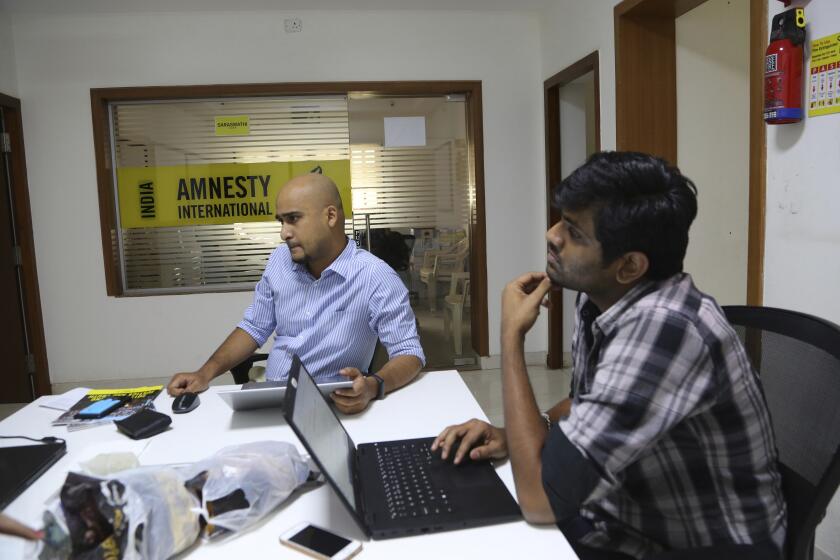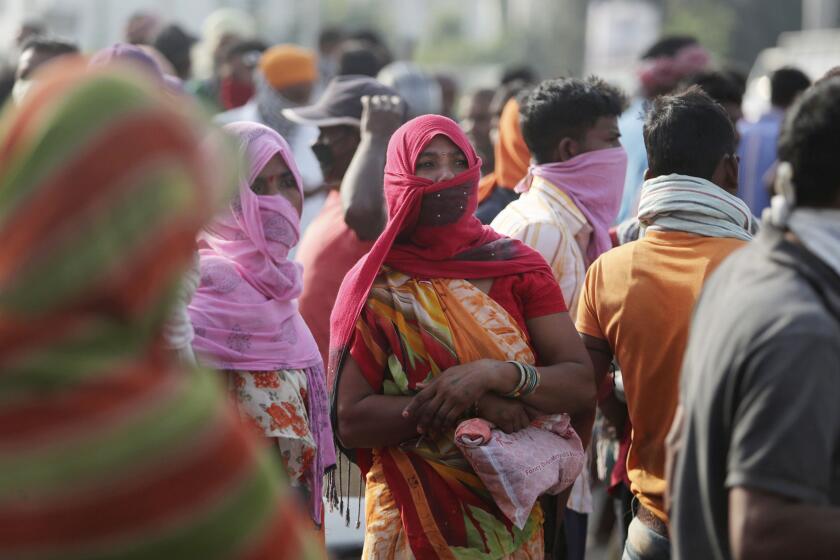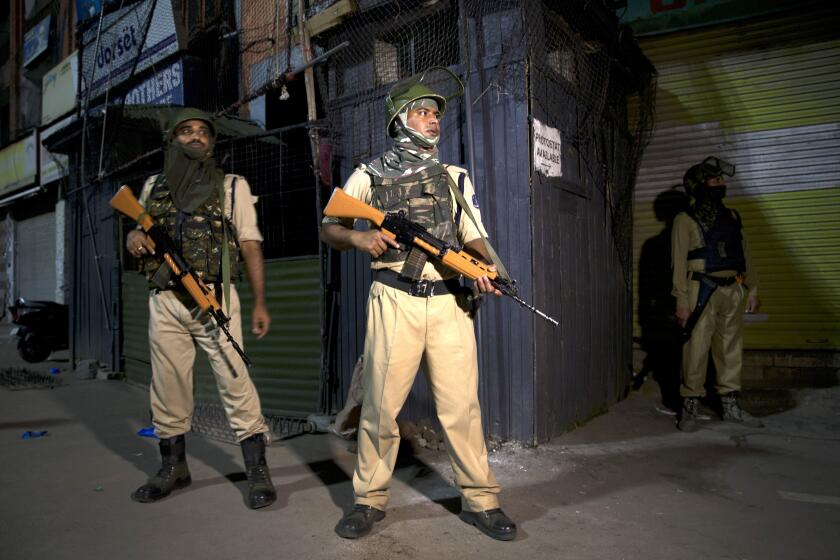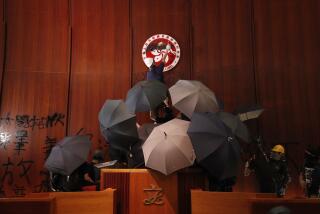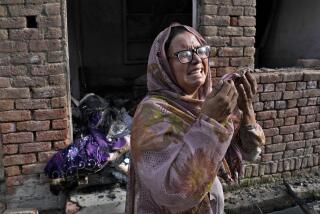32 acquitted in razing of India mosque that set off deadly violence
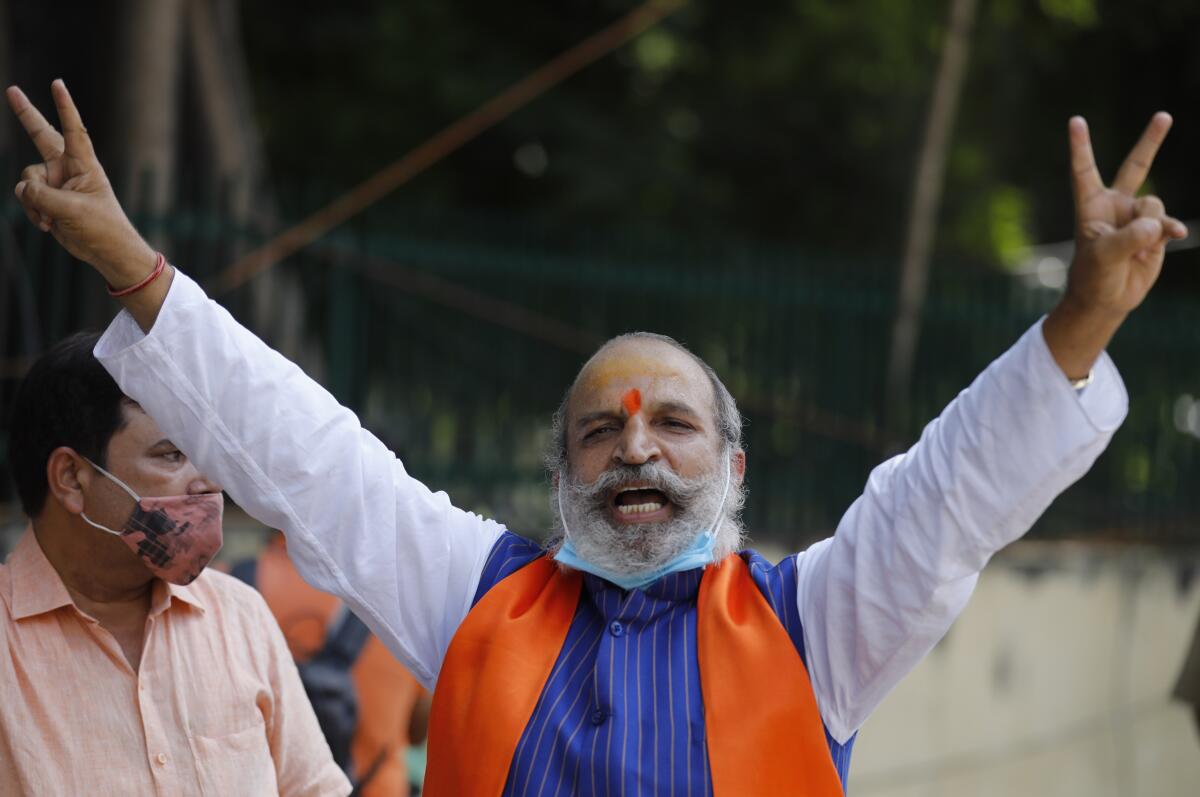
- Share via
LUCKNOW, India — An Indian court Wednesday acquitted 32 people who had been accused of crimes in the 1992 demolition of a 16th century mosque that sparked Hindu-Muslim violence in which 2,000 people were killed.
Four senior leaders of the ruling Hindu nationalist Bharatiya Janata Party, or BJP, were among the defendants in the trial, which languished in India’s sluggish legal system for almost 28 years. Seventeen of the 49 defendants died of natural causes during the trial.
The four BJP leaders were accused of making inflammatory speeches that incited tens of thousands of their followers who had camped out in the city of Ayodhya ahead of the attack on the mosque.
The verdicts Wednesday come amid increasing anti-Muslim sentiment in India that critics say has been stoked by the BJP-ruled government of Prime Minister Narendra Modi.
Last year, India’s Supreme Court ruled in favor of building of a Hindu temple on the disputed site. Hindus believe that their god Ram was born there and claim that Emperor Babur, a Muslim, built a mosque on top of a temple at the site.
But the Supreme Court also ruled that the demolition of the mosque, known as the Babri Masjid, was illegal and ordered that the trial in the demolition case be completed expeditiously.
The human rights group says its bank accounts were frozen in an ongoing crackdown against critics of Prime Minister Narendra Modi.
Judge Surendra Kumar Yadav ruled Wednesday that there was no conclusive evidence to prove a criminal conspiracy by hard-line Hindu activists to attack the mosque, said attorney Rishab Tripathi, who represented one of the defendants.
“The incident was not pre-planned,” Yadav said in his ruling in Lucknow, the capital of the state of Uttar Pradesh. “The leaders present there actually tried to control and pacify the mob.”
Some of those acquitted and their supporters shouted ”Jai Shree Ram,” hailing the Hindu god Ram, in court. They later distributed sweets outside the court to celebrate the decision.
The four BJP leaders acquitted — L.K. Advani, Murli Manohar Joshi, Uma Bharti and Kalyan Singh — have said that the mosque’s demolition was a spontaneous eruption by angry Hindu activists.
India’s coronavirus tally has reached 6 million cases, double the total recorded barely a month ago and second overall only to the U.S.
I.B. Singh, an attorney who represented Joshi, said that investigators couldn’t prove the authenticity of audio and video evidence submitted in the case.
Joshi, who was a minister in a former BJP government, said: “The truth has triumphed.’’
Another defendant, Jai Bhagwan Goyal, said: “We had done nothing wrong. The whole of India is happy. Lord Ram’s temple is coming up in Ayodhya city.”
Muslim leaders plan to challenge the acquittals in an appeals court. “This is an erroneous judgment, as it is against evidence and against law,” said Jaffaryab Jilani, representing the All India Muslim Law Board.
The Indian government order eliminates the state of Jammu and Kashmir’s right to its own constitution and decision-making process for most matters.
The verdict also was sharply criticized by Maulana Khalid Rashid, chairman of the Islamic Center of India, who said that Muslims have always respected court decisions, but that this was an injustice to the community.
“When the Supreme Court said that the demolition of the mosque was an unlawful act, how can a lower court set free the accused?” he said.
Rashid said Muslim organizations should evaluate whether it is prudent to challenge the decision. “Will Muslims get justice there?” he said.
On Dec. 6, 1992, tens of thousands of Hindus gathered for a rally near the disputed site, and groups of them climbed the mosque and demolished it with axes and hammers.
Breaking News
Get breaking news, investigations, analysis and more signature journalism from the Los Angeles Times in your inbox.
You may occasionally receive promotional content from the Los Angeles Times.
The accused included Advani, 92, a co-founder of the BJP, who served as deputy prime minister from 2002 to 2004 under Prime Minister Atal Bihari Vajpayee. Bharti is also a former government minister, and Singh, 88, was the top elected BJP leader in Uttar Pradesh when the mosque was destroyed.
In its ruling last November, the Supreme Court ordered the entire disputed area of nearly three acres acres to be allocated to Hindus for the construction of a temple, while five acres at another location were to be allocated for the construction of a mosque in Ayodhya.
More to Read
Sign up for Essential California
The most important California stories and recommendations in your inbox every morning.
You may occasionally receive promotional content from the Los Angeles Times.
